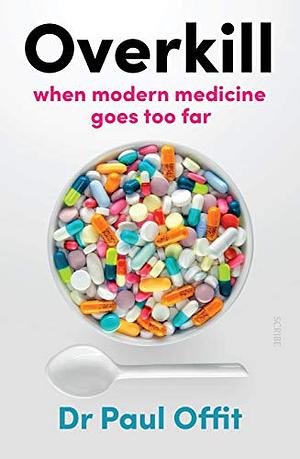
Overkill: When Modern Medicine Goes Too Far
by Paul Offit
Genres: Non-fiction, SciencePages: 286
Rating:

Synopsis:An acclaimed medical expert and patient advocate offers an eye-opening look at many common and widely used medical interventions that have been shown to be far more harmful than helpful. Yet, surprisingly, despite clear evidence to the contrary, most doctors continue to recommend them.
Modern medicine has significantly advanced in the last few decades as more informed practices, thorough research, and incredible breakthroughs have made it possible to successfully treat and even eradicate many serious ailments. Illnesses that once were a death sentence, such as HIV and certain forms of cancer, can now be managed, allowing those affected to live longer, healthier lives. Because of these advances, we now live 30 years longer than we did 100 years ago.
But while we have learned much in the preceding decades that has changed our outlook and practices, we still rely on medical interventions that are vastly out of date and can adversely affect our health. We all know that finishing the course of antibiotics prevents the recurrence of illness, that sunscreens block harmful UV rays that cause skin cancer, and that all cancer-screening programs save lives. But do scientific studies really back this up?
In this game-changing book, Dr. Paul A. Offit debunks fifteen common medical interventions that have long been considered gospel despite mounting evidence of their adverse effects, from vitamins, sunscreen, fever-reducing medicines, and eyedrops for pink eye to more serious procedures like heart stents and knee surgery. Analyzing how these practices came to be, the biology of what makes them so ineffective and harmful, and the medical culture that continues to promote them, Overkill informs patients to help them advocate for their health. By educating ourselves, we can ask better questions about some of the drugs and surgeries that are all too readily available--and all too heavily promoted.
I really enjoyed Paul Offit’s Overkill — if you can talk about enjoyment when it’s clear that our medical and public health bodies are getting a lot of things wrong because it’s hard to go back on what you once thought would help people. Offit tells us that well-established procedures like placing a stent in an artery to help relieve a blockage don’t offer any benefit over medication, that we don’t need to finish a course of antibiotics (and in fact that doing so will add to incidental resistance), that there’s virtually no vitamin D deficiency, and that knee replacement surgery rarely offers benefits better than simple physical therapy and lifestyle changes.
He doesn’t just tell us, though. He quotes the studies and gives us the tools to look at the data for ourselves. I haven’t had time yet to fully explore the stuff he quotes and references, and so for that one reason, I’d leave an asterisk here and say that I’m not vouching for it, and people should go look at this stuff and read it for themselves. However, it fits with my existing knowledge, and it’s important to read him attentively. When it comes to antibiotics, for example, he doesn’t say to just stop it when you feel like it (which would be bad), but rather that we need new time limits that aren’t quite so arbitrary and correspond with when people feel better (and therefore when the bacteria are dead or dying and probably getting under the control of the immune system as well).
Five-day and seven-day courses aren’t magic numbers, they’re just the number of fingers on one hand and the number of days in a week, respectively: they’re handy figures for us, but they’re not necessarily medically backed. And indeed, generally you need just three days of antibiotics for a urinary tract infection, for example. (I think in the UK we may be moving in that direction?)
Most importantly of all, he tells us to go look for this information ourselves, right in the introduction to the book. That’s rarely said by someone who just wants you to believe them and let them do the work. But, if you’re a layperson reading this, he definitely provides some background and a direction to go in.
Rating: 4/5
